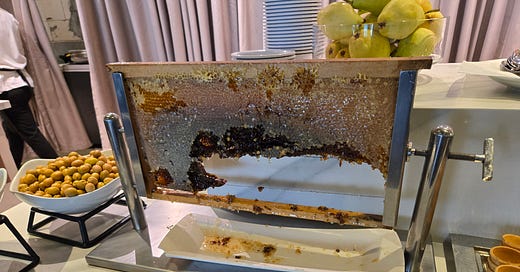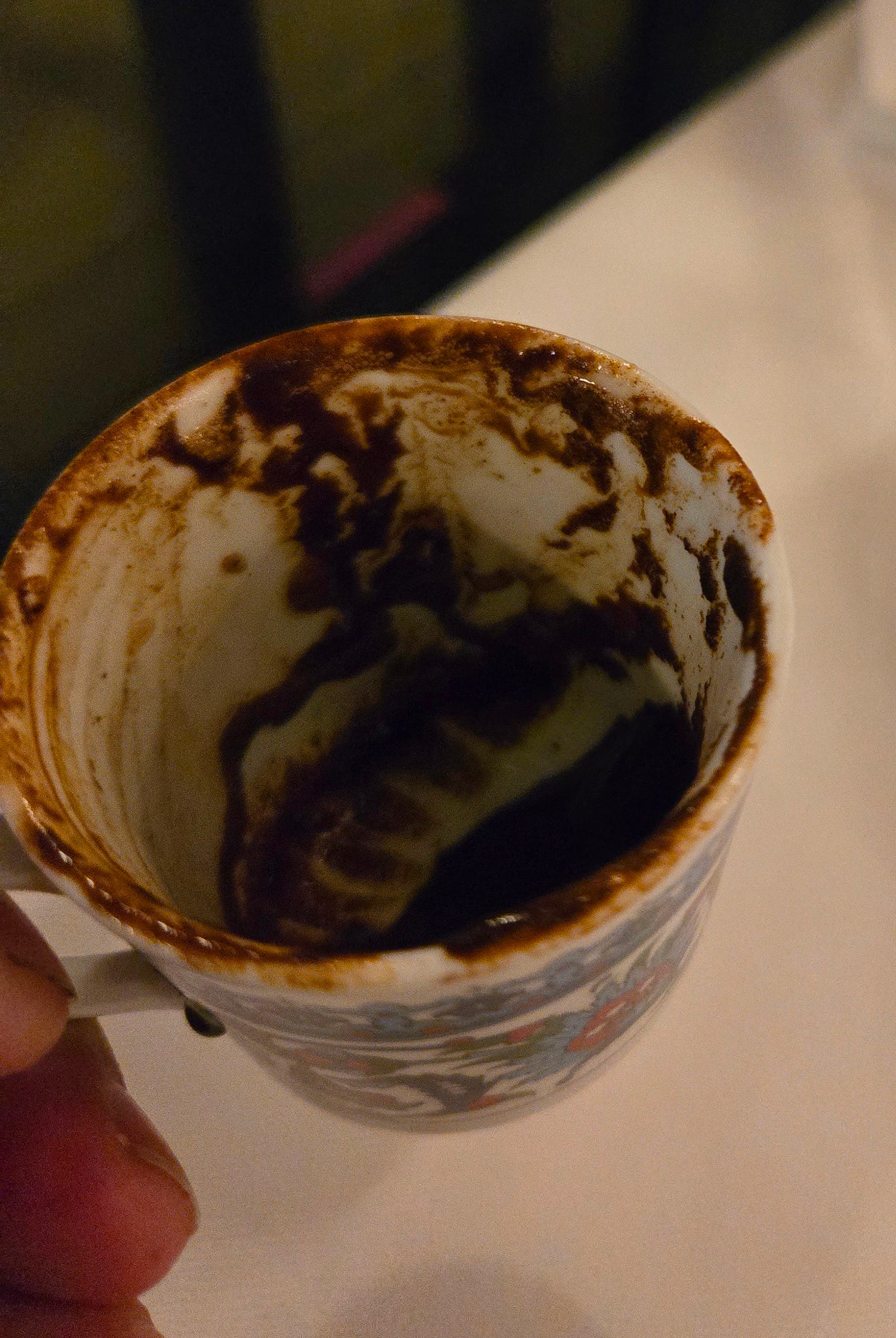Just Like Home!
... We're talking Turkey today. And it isn't good. Something here smells foul.
Hello. What you are looking at is a huge honeycomb, nearly two feet wide by one foot high, on a buffet table in a nice hotel restaurant in downtown Istanbul. Guests are invited to cut freely from the slab of this freshest of all possible honey, to mix with their many and varied breakfast yogurts.
These breakfasts are inventive and wonderfully fresh: Many varieties of olives, yogurts dusted with fresh mint, an unusual casserole of shredded bologna in a mild cheese roux, a parfait of yogurt and little fresh berries of unfamiliar provenance, fresh fruits, stewed eggplant, little Danish pastries, dates, baklava, sour cherry juice, and Turkish coffee, which is a celestial mud. It is a Middle Eastern custom to turn over one’s coffee cup onto its saucer, then look at the cup and divine a fortune from the shape of the dregs. This is what our dregs looked like.
We divined our fortune thus: We will get diarrhea.
Rachel and I are in Istanbul, now sated by overindulgence in that sumptuous breakfast, walking the streets and taking in the daily Dance of the Seven Rug Salesmen. In the mornings and afternoons, almost every local man in the street seems to be selling rugs but they all say they are not selling rugs. They burst out of their rug stores and accost you in the street, friendly and welcoming with helpful information and heartwarming little stories and they will you take you gently by the elbow and try to steer you inside to partake of celestial mud and get to know you and just be your friend because they like Americans or Belgians or Germans or whoever you happen to be. They speak many languages adequately; they all seem to have this skill. Then they try to sell you a rug.
Here is a handsome, cultured, cosmopolitan guy who inquires solicitously about where we are going and can he help us with directions, and there is no rug shop in sight, so we are trying to figure out what his angle is, and then he says, “Would you like to see my rug shop? Crooking a finger: Come. Come.”
Now we are inside, and, just making conversation, and he tells us that overnight the president of Turkey — an autocrat Donald Trump admires and emulates — has arrested the mayor of Istanbul, his main political rival, by having police storm the man’s home and charge him with corruption.
“What?”
Yes, he says, mournfully. “They say he has done bad things, but he has not.” Would you like to see some rugs? He says he can arrange to have them shipped to our home, so we don’t have to schlep them home, he says, using a Turkish word for “schlep.”
“What about the mayor?” we say.
Yes, the rug salesman said. They mayor is named Ekrem Imamoglu. He is very popular with the people of Istanbul. He has done fine things for the people. This, the salesman says, stands in contrast to the strongman president of the country, Recep Tayyip Erdogan, who, he says, “is a psychopath.” This is all he wishes to say to the Americans about this particular subject. He did not ask for this, but we are not telling you his name, for his protection. He did not know we are journalists.
This item is in the news but it is not on everyone’s lips. Erdogan just yesterday ordered the police to arrest Imamoglu on charges of extortion and fraud and aiding terrorism. It is on the eve of a primary election in which Imamoglu was expected to become his party’s candidate for the 2028 presidential elections. Turkish law forbids Erdogan from running again, but his supporters are trying to change that legislatively, or some other way.
This all sounds creepily familiar. Doesn’t it?
The very day before, in the United States, Donald Trump ordered a raid on a private Nonprofit organization, U.S. Institute of Peace, a Congressionally created agency that is not, technically, under the president’s control. For whatever reason — possibly because their mission is to help defuse international tensions — Trump does not like them. According to The Washington Post, its president was removed from its headquarters with the assistance of the office of the U.S. Attorney for the District of Columbia, the FBI and D.C. police. The guy left, under threat of prosecution.
So.
What are the people in Istanbul going to do?
“We will wait and see,” said one rug salesman to us. “We will know tomorrow.” He was grim, but focused more on being ingratiating to make a sale. He informed us that his name means “the last soldier,” because he was the last of seven siblings. Business is business. Tomorrow is tomorrow.
“We will wait and see” seems to be everyone’s answer here. Things are bad, but not that bad, yet.
As it gets nearer dinner time, the restaurant salesmen begin to emerge, showing you photos of their delicacies, which they have compiled into plastic-album books, which they flip through for you. Kabobs. Lamb shoulders. Local drinks such as Raki, which is an unnerving, but wildly potent, licorice whiskey.
These restaurant people are also merchants. They are also not anxious to talk about this national unpleasantness, which they clearly do not like. For one thing, it is making the Turkish lira kind of unstable; this is good for you, though. Come, eat, buy. Food and rugs will be cheaper for Americans.
One restaurateur calls after us, after we keep walking past him, “I am just trying to get your money!’ We turn back. He is smiling broadly, as are we. The Turks have a good sense of cynical joy.
We ask a man if there will be protests on behalf of Ekrem Imamoglu. There won’t be, he predicts, because Erdogan has outlawed public gatherings for a few days, and increased police presence; a boulevard around the police station where İmamoğlu was taken into custody was locked down.
A worker at our hotel told us he woke up today with no Internet service in his home. Erdogan, it is believed, has cut off Internet service — and with it, all social media — for these same few days, apparently until after the election that was expected to elevate the Istanbul mayor to become his opposition party’s leader and presumptive presidential candidate in three years.
When police surrounded his home yesterday, Imamoglu made a video, as he was dressing in a shirt and tie for his incarceration of indeterminate length — exhorting his leaders to stay strong:
“This is a blow to the will of the people.”
“Hundreds of police officers have arrived at my door. I entrust myself to the people. The police are raiding my home, knocking on my door,” he said.
“I stand resolute, entrusting myself not only to the 16 million residents of Istanbul but to the 86 million citizens of Turkey, and all who uphold democracy and justice worldwide, I stand firm in my fight for fundamental rights and freedoms.”
—
Yesterday, we visited Topkapi Palace, a sprawling vast complex of ancient buildings dating back to 1450, with lavishly bejeweled objects, priceless mosaic, priceless 18th and 19th century clocks from Germany, Switzerland, France and England. This was the phenomenally opulent home of generations of Turkish sultans, their harems, and their enormous staffs of manservants, maidservants and cooks, with three mosques just for the cooks, many eunuchs, who were employed as trusted guards and administrators, and so forth. The number of servants seems to have been more than ten times the number of residents. It stands as a monument not just to the stately history of Turkey, but to a time of almost incomprehensible inequitable distribution of private wealth.
You know, like today.
—
Outside the palace, a man approached us, trying to sell us a rug. We politely declined, and yet, still he wanted to talk to the Americans.
We asked: Does he think there will be protests over the mayor’s imprisonment? We would like to see one if it happens, we said.
No, he said, because of the bans. Erdogan means business.
Then he brightened.
“I have a large family, I could get them all together and we could protest for you! If you buy a rug!”
—
There were, in fact, some limited protests yesterday, particularly at Istanbul University, but they were largely contained, no doubt by the legal and police strictures Erdogan imposed.
Here is a salesman named Moussa. Like the rest, he does not want us to buy a rug, just wants to show us hospitality. Then he cajoled us into his rug store, a nice place with ample, handsome products everywhere. He sits us down to meet with his brother, Shahim, who seems to be the owner. His brother has visited the United States to sell rugs there. He has been to Miami. He likes America. There is an animal in the store, a shy little female tiger cat named Stephane.
There are cats all over the streets of Istanbul. All the people feed them, but nobody owns them It seems a sweet, unencumbered relationship. They will belly up to you, and petition for skritches. “Here, put your finger in her mouth,” urges Moussa’s brother, Shahim. “She won’t hurt you.” Rachel looks dubious. Stephane does not seem eager to be interfered with. “Put, put,” Shahim urges Rachel.
Rachel massages the cat’s mouth. It opens, reluctantly, and she maneuvers her forefinger in there, crosswise like a dog with a bone. Stephane chomps down, not very hard, but hard enough to widen Rachel’s eyes. She holds her jaw there, in that semi-uncomfortable state, for quite a while. It is as if she is saying, “I could hurt you if I want.” Shahim beams: See, it is not so bad.
Somehow, I find myself thinking of Erdogan, and Trump. See, it is not so bad, yet.
Right now, Erdogan hurts a little, not too much. Commerce continues, unimpeded, still aggressive, still hopeful. Rugs and food to be sold.
—
I am back in my room, checking the New York Times website.
A story at the top of the home page is about how Gen Z’ers and Millennials are fighting about fashion trends in gym clothes. Life goes on, unimpeded. As though nothing much is happening.
—
It is late at night, 4.am., as I am writing this. I am a little restless and upset. I wander down to the bar and restaurant. Oddly, they are both open for business, and kind of bustling. We are in the middle of Ramadan, and Muslims eat very early and very late, because fasting is mandatory after sunrise and before sundown. Customs are customs. Life goes on.
I order a double raki, and down it in a minute or two. It is punishment, but good punishment.
Back in my room. Rachel is asleep. I must use the bathroom. There is an unfamiliar plumbing fixture next to the toilet on which I am seated. I twist the knob, and gasp. It is a bidet, just like American bidets, only more powerful and instead of a soothing warm stream it is a frigid firehose. A savage jolt of very cold water to a very vulnerable body part.
I needed that, I think.
—
Today’s Gene Pool Gene Poll:
Okay, thanks. That’s it.
Please, if you have the means and the inclination, consider becoming a paid subscriber to The Gene Pool. It is $5 a month, or $50 a year. Much cheaper than a rug.
—
I am back on Friday. Expect one more foreign dispatch.







Could it happen here? I want the answer to be "No! Not in America," but actually the answer seems to be "Yes."
Is it happening here? I want the answer to be "No!" but actually, and sadly, tha answer seems to be "Yes." Especially the way Trump is grooming Americans -- and yes, I understand that is a term describing abuse -- grooming Americans to think about another Trump presidential term after this one. Another term, which is forbidden by virtue of the 22nd amendment to a document called the Constitution which Trump sees as an annoyance.
The Turkish people I encountered last fall were great admirers of Attaturk, who gave Turks a strong nation just over a century ago and allowed Turks to worship, or not worship, as they chose. None of the Turks I met expressed any admiration for today's Erdogan.
So, did you buy a rug?